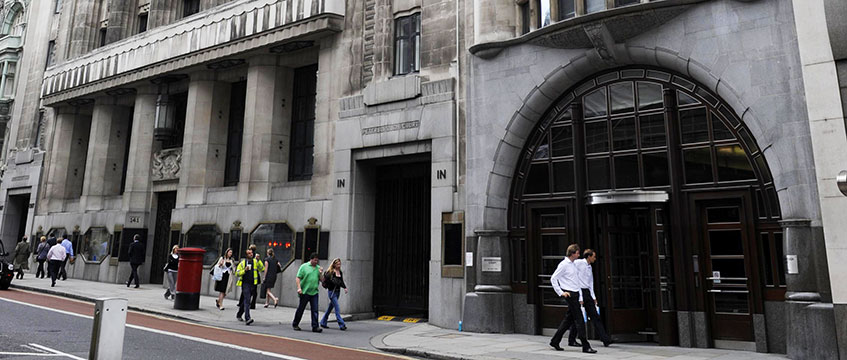WeWork’s plans to lease Peterborough Court on Fleet Street, EC4, have ended as its Qatari owners have turned to Lipton Rogers and PLP Architecture to revamp the property.
WeWork had been in talks since last May to take on the 350,000 sq ft being vacated by US investment bank Goldman Sachs at the property. This would have been significantly bigger than its current largest co-working spaces: Two Southbank Place, SE1, and 30 Churchill Place, E14, both of which are around 280,000 sq ft.
However, the appointment of Lipton Rogers and PLP means the WeWork deal will not proceed.
The grade II listed property is owned by Fleet Street Investment II, a Cayman Islands-registered company controlled by members of the Qatari royal family.
The building was once occupied by The Daily Telegraph and was acquired by its current owners in 2012 for £264m from a consortium of banks led by Landesbank Berlin, which took control after its previous owner, Antedon, defaulted on a loan in 2010.
Goldman Sachs’ rent at the property was more than £16m a year, according to Radius Data Exchange. The lease runs until 2026 but has a break at the beginning of 2021.
The firm has been moving from several buildings in the area to its new 826,008 sq ft headquarters on Farringdon Street, close to Deloitte’s head office.
News of the refurbishment comes as London property owners prioritise revamping existing assets amid a lack of speculative development opportunities. Last year, EG revealed CO-RE had been appointed to lead the redevelopment of one of Goldman Sachs’ other Fleet Street buildings, known as River Court, by Joseph Lau’s Chinese Estates Holdings.
Lau’s firm acquired the 430,000 sq ft office property in 2011 for £280m from Gresham Down Capital Partners.
Meanwhile, earlier this year, EG reported the co-owner of Battersea Power Station, Permodalan Nasional Berhad, had appointed LaSalle Investment Management to deliver a revamp of 175 Bishopsgate, EC2.
Permodalan Nasional Berhad acquired 175 Bishopsgate from KanAm Grundinvest Fonds in 2012 for £395m, according to Radius Data Exchange.
Goldman’s exit from Fleet Street, alongside other planned departures by high-profile occupiers such as law firms Freshfields and Withers and accountancy firm Deloitte, has prompted a rethink of how to promote the neighbourhood and draw in new tenants.
Members of the Fleet Street Partnership, a band of property investors, developers and agents, have teamed up to map out a new vision for the area. The organisation aims to oversee a Fleet Street business improvement district, an area in which businesses pay an additional levy to fund services such as security or extra street cleaning.
Meanwhile, WeWork has been focusing on its profitability and slowing its expansion following its failed IPO attempt last year. It most recently opened office space in Canary Wharf within 30 Churchill Place, E14. It is subletting the 284,704 sq ft of space across 12 floors from the European Medicines Agency.
Even prior to its IPO, which collapsed in September, WeWork had encountered difficulties closing some deals amid landlord concerns about the strength of WeWork’s covenant.
In January 2019, it emerged that WeWork’s plans to take about 45,000 sq ft of space at 125 Deansgate in Manchester had fallen through. The flexible office provider had been under offer to take the space but negotiations failed, with the landlord concerned about how WeWork could affect the value of the building.
Landlords are wary of WeWork’s use of special-purpose vehicles to hold individual leases. Some are worried that, in a worst-case scenario, the company could have the option to fold those SPVs if there is an economic downturn, or after rent-free periods come to an end.
To send feedback, e-mail louise.dransfield@egi.co.uk or tweet @DransfieldL or @estatesgazette











